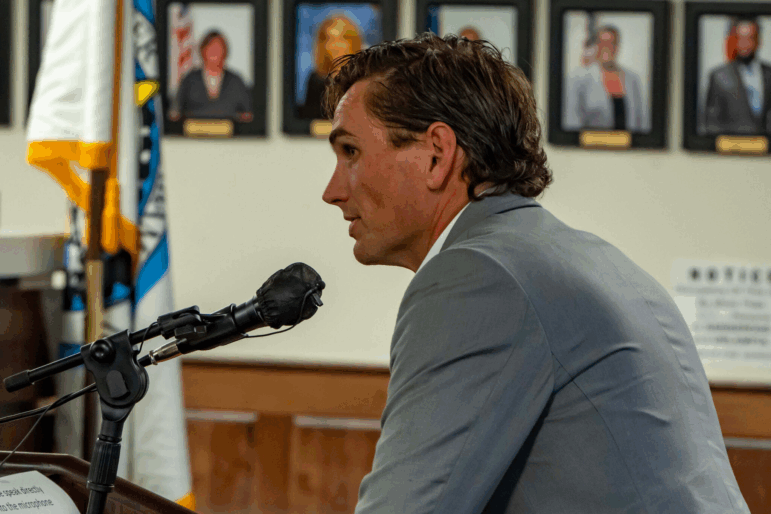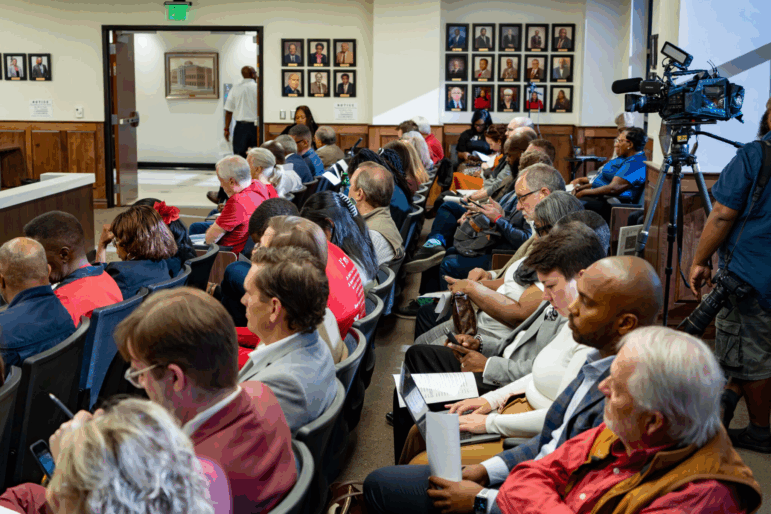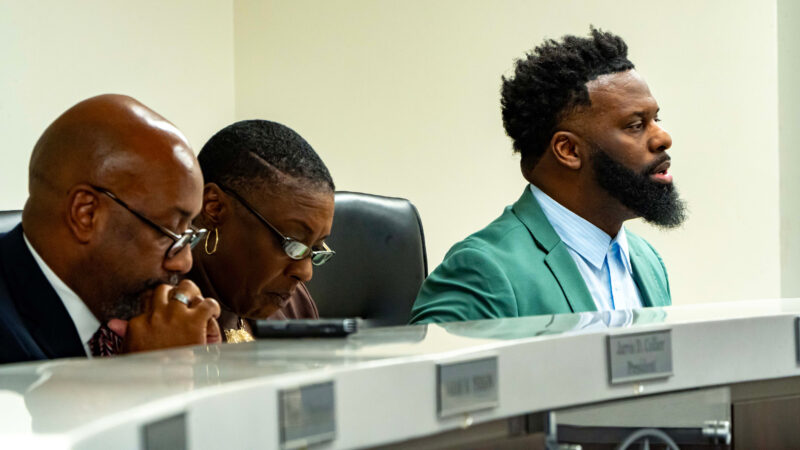Bessemer City Council approves rezoning for a massive data center, dividing a community
Bessemer City Council member Cleo King explains his vote against rezoning for Project Marvel in a November meeting.
This article originally appeared on Inside Climate News, a nonprofit, independent news organization that covers climate, energy and the environment. It is republished with permission. Sign up for their newsletter here.
By Lee Hedgepeth, Inside Climate News
BESSEMER, Ala.—Cleo King prays about every vote he casts on behalf of the people he represents in this city of 25,000 just southwest of Birmingham.
And on Tuesday, King said those prayers led him to vote against rezoning hundreds of acres of forested land at the city’s edge to make way for a 4.5 million square foot data center. King and his colleague Donna Thigpen were the only two council members to vote against the proposal, called “Project Marvel,” which has been nearly universally opposed by the residents who live near the site.
Five members of the Bessemer City Council, a majority, voted to approve the rezoning, providing a path forward for the massive $14.5 billion project, billed by developers as one of the largest private investments in state history.
In paving the way for Project Marvel, King said the council has made a grave mistake, discounting residents’ legitimate concerns about the impacts of the construction and operation of a data center slated to include 18 buildings the size of Walmart Supercenters and consume a massive amount of water and electricity.
“I’ve had the conversation with my colleagues,” King told Inside Climate News after Tuesday’s meeting. “We needed to hear from the people, and we needed to listen.”
Earlier that morning, the people spoke.
One after another, wearing red to express their opposition, resident after resident took to the podium to voice their concerns about Project Marvel, from economic to environmental. As in previous meetings, representatives of Logistic Land Investments, the developer behind the project, told council members that Project Marvel will be a financial boon for Bessemer and will cause no negative impacts for either residents or the environment.
“We’ve gotten a clean bill of health from the site,” said Brad Kaaber of Logistic Land Investment. “Otherwise we’d be looking at other sites.”
Kaaber has repeatedly cited environmental assessments and other analyses of the site, though none of these documents have been made public. At Tuesday’s meeting, he sat at a table with city staffers, instead of in the audience with members of the public.

King said even as a council member, he has not seen any additional planning documents answering the questions raised by residents and environmental groups. He said that makes him doubt Kaaber’s claims about a “clean bill of health.”
“I haven’t seen that,” King said.
Kaaber also told council members there would be no electricity rate increases by Alabama Power as a result of the project, which could increase demand for electricity statewide by as much as 10 percent.
King said Kaaber isn’t in a position to be able to make that guarantee.
“I don’t believe it,” King said. “Somebody is going to front the bill.”
A document produced by Evans & Evans, the law firm representing the developer, suggests that the proposed data center campus would consume around 1,200 megawatts of energy once operating at full capacity. That’s more than 90 times the amount of energy used by all residences in Bessemer and more than 10 times the amount of energy used by all residences in Birmingham annually.
Alabama Power has said that data centers will “pay the full, fair cost to serve their needs,” but the company, which already has the highest residential electricity bills in the country, has refused to say whether agreements with data center customers will be made public.
Michael Staley, former longtime chief of staff of Republican U.S. Rep. Spencer Bachus, spoke in favor of the proposed rezoning, dismissing opponents of the project as “anti-growth.”
“It’s unfortunate that anti-growth interests are against reasonable outcomes,” Staley said. He now serves as executive director of the Coalition for Regional Transportation. “I think [homeowners] have been hijacked in some ways.”
Ryan Anderson, staff attorney for the Southern Environmental Law Center, an environmental nonprofit, pushed back against Staley’s assertions.
“That could not be further from the truth,” Anderson said. “The only reason SELC ever got involved in this was because residents came to us for months begging for help because they could not get basic questions about this project answered.”

Anderson said that she was shocked by how little is still publicly known about the project after months of public hearings.
“You can’t answer the most basic questions about what company is building a data center here,” she said.
Representatives for the developer have previously said that while they’re in discussions with several large companies, they have not yet secured a definite end user.
During the meeting, several representatives of the local school system testified in favor of the data center proposal.
Michael Turner, superintendent of Bessemer City Schools, appeared dismissive of concerns over the Birmingham darter, an imperiled fish species likely present on the site that researchers said could be made extinct by the facility’s construction and operation.
“We certainly don’t want to hold claim to the extinction of a fish, but I think we have to look at what’s valuable for a human being, for a student,” he said.
Turner and others have pointed to tax revenues from the project as a potential boon for the local school district, though estimates about the impacts have varied widely. Alabama state law allows data centers to receive tax abatements for 30 years if certain, limited requirements are met by developers.
Critics of the project have pointed to air pollution from on-site backup diesel generators as one example of how the project could directly impact students in a negative way.
Estimates based on other hyperscale data centers suggest that the proposed Bessemer data center campus would need between 300 and 500 diesel generators to provide a reliable backup source of electricity for the facility. Even with an uninterrupted power supply, testing generators intermittently would produce a significant amount of emissions, contributing to dangerous air pollution.
Exposure to diesel exhaust from generators can lead to “serious health conditions,” according to the U.S. Environmental Protection Agency. Diesel fumes are “likely to be carcinogenic to humans,” the federal agency says. The International Agency for Research on Cancer goes one step farther, labeling diesel exhaust carcinogenic.
“Westhills Elementary and Jonesboro Elementary are less than five miles away,” Julianne Tharp, an activist with GASP, an anti-air pollution nonprofit based in Birmingham, told council members. “Exposure to air pollutants has been shown to affect children’s respiratory and cognitive development, including their IQ, and we need these kids to be smart if they’re going to be taking care of us one day.”
Ron Marshall, a former Bessemer City Council member, told the body’s current members that they should be worried about their own constituents, not those living around the data center site but outside Bessemer’s city limits. Marshall called criticism of the project “a bunch of yak, yak.”
“I believe that you as council are not going to let anybody outside of the city limits of Bessemer tell us what’s best for us,” Marshall told council members. “We can make that decision. You will make that decision. I declare that you will make that decision today.”
Marshall turned out to be right about the vote. But King, the councilmember, said that attitude—that the opinion of those living around the site but outside of Bessemer don’t count—is toxic.

“Regardless of whatever color or creed or ethnicity you are, you still matter,” King said. “Your voices should still be heard.”
King said he was never asked to sign a non-disclosure agreement, but that he believes those who did sign the secrecy agreements may not have had their constituents’ best interests in mind.
“It’s a disservice,” he said of public officials who’ve signed NDAs. “It’s not being transparent with the people, and I always want to make sure that we’re transparent in everything we do.”
Controversy around Project Marvel has clearly impacted council members. During Tuesday’s meeting, member Carla Jackson, who voted in favor of rezoning, said pressure from citizens has creeped into her visits to the supermarket.
“We can’t even go to Walmart because of all the badgering,” she said.
Some of that dynamic is part of the job, King said, noting that he’d been badgered for his opposition by data center proponents.
King said that early on in the process of considering the data center proposal, he received some “tense” communications related to his opposition.
“It was just words—slurs,” King said. “But as my own individual, I was elected by the people in my city, and I’m always going to speak my mind. I’m tough-skinned.”
So are the residents opposing Project Marvel. One of them, Mary Rosenboom, was escorted from the council chambers by Bessemer police after she continued past her three minutes of speaking time.
“I had something to say,” she said after the meeting, laughing. “I wish they’d listen.”
Iran’s supreme leader warns any US attack would spark ‘regional war’
Iran's supreme leader warned Sunday that any attack by the United States would spark a "regional war" in the Mideast, further escalating tensions as President Donald Trump has threatened to militarily strike the Islamic Republic.
Minnesota citizens detained by ICE are left rattled, even weeks later
The number of immigration agents in Minnesota may be reduced, but they'll leave leave behind a changed community, including many U.S. citizens questioned and detained in recent weeks.
Gaza border crossing buzzes with activity after years of near-complete closure
Reopening the border crossing is a key step as the Israel-Hamas ceasefire moves ahead.
Democrat Taylor Rehmet wins a reliably Republican Texas state Senate seat, stunning GOP
Democrat Taylor Rehmet won a special election for the Texas state Senate on Saturday, flipping a reliably Republican district that President Donald Trump won by 17 points in 2024.
Trump says feds won’t intervene during protests in Democratic-led cities unless asked to do so
President Donald Trump said Saturday that he has instructed Homeland Security Secretary Kristi Noem not to intervene in protests occurring in cities led by Democrats unless local authorities ask for federal help.
U.S. intervention in Venezuela divides Houston
In nearly two dozen interviews, Houstonians expressed everything from admiration and relief to skepticism and dread following the seizure of leader Nicolás Maduro.








